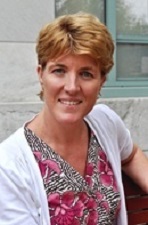
Winter 2017-18
Insights Into a Career in Family Health and Obesity Prevention: An interview with Dr. Kirsten Davison
April Bowling, ScD and Rebeccah Sokol, MSPH; Child and Family Health Special Interest Group (CFH SIG) Outlook Liaisons

Kirsten Davison, PhD
The CFH SIG interviewed Dr. Kirsten Davison to learn more about her career in family and child health and obesity prevention. Dr. Davison, the Donald and Sue Pritzker Associate Professor of Nutrition at the Harvard Chan School of Public Health, has made substantial contributions to family-centered interventions for obesity prevention. Dr. Davison is the creator of the Family Ecological Model and most recent awardee of the 7th Annual Alice Hamilton Award from the Committee on the Advancement of Women Faculty at Harvard.
CFH SIG: What drew you to the field of family-based interventions?
Dr. Davison: Pursuing the field of child development grew from my parents running childcare centers. I worked in those settings from an early age and through college, so I knew that my work would involve children—and with children come families.
CFH SIG: You are well-known as the creator of the Family Ecological Model. What led you to writing that seminal paper?
Dr. Davison: My original training was in human development, where theory is central to all research. That background led to training in applying and adapting existing theoretical frameworks to interventions. I took a class from Nancy Downing, a mentee of Bronfenbrenner, and found her approach to theory helpful. Moving into research on childhood obesity was uncommon for a researcher in human development. Given this direction, I needed to make sense of a multitude of cross-disciplinary literature, and using a theoretical framework was my way to connect dots. To some extent I find using theory is an uphill fight in public health nutrition. It is becoming more common, but it isn’t instinctive, and I think that impacts translational value. For that reason, I have worked to revise the public health nutrition curriculum at Harvard’s Chan School of Public Health to include core coursework in theory and its application.
CFH SIG: What advice would you give to current doctoral students interested in child and family health research?
Dr. Davison: It is advantageous to have some training in human development. Even if you are doing research in nutrition or another field, knowledge of human development allows you to be comfortable with literature regarding family structure and family impacts on health; this helps you find levers for change in child health.
CFH SIG: You have invested significant time and energy into academic mentorship. What made you decide to focus on mentorship, and what advice would you give post-docs and junior faculty seeking mentorship?
Dr. Davison: I’m not sure if it was a conscious decision. I think it was already part of my schema of what it means to be a faculty member, born out of my graduate experience with my own mentor, Dr. Leann Birch. I’ve modeled the culture of my own lab on hers, and she remains a collaborative and guiding force. You may have unique barriers to mentorship at your institution, so sometimes you need to look outside. Take advantage of conferences and research societies – the Society of Behavioral Medicine offers mentorship opportunities. Reach out to people whose work you admire; right before conferences is a great time because then you can meet for coffee in person.
CFH SIG: You have a diverse ongoing research portfolio. What avenues are you currently most excited about?
Dr. Davison: I am energized to take on research with fathers. We are preparing for a large study on how fathers affect children’s health behaviors. I am currently working on funding for this research; it is hard because the perception is that mothers are what matters. But the cultural context of fatherhood has changed in the last couple of decades, and we need to understand fathers’ roles in family health. I am also excited about implementation science. It helps us move beyond randomized controlled trials by giving us generalizable interventions. I’m excited that implementation science is opening a new set of theories and methodologies that reach across disciplines. That’s going to propel childhood obesity research forward into new directions.